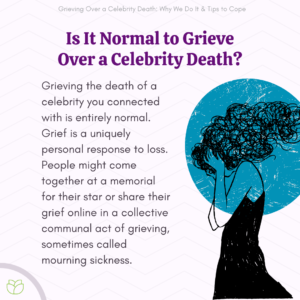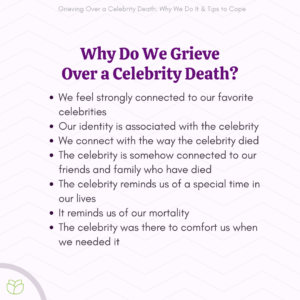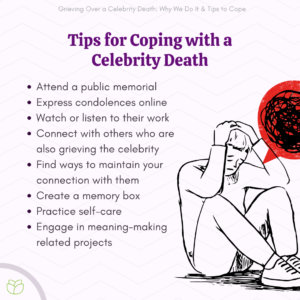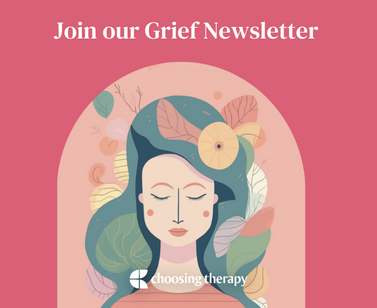Although people might minimize or dismiss your grief, grieving the death of a celebrity you admire is normal. Grieving this type of loss makes sense when considering the impact this person might have had on your life. It is vital to acknowledge your loss and how you feel and find ways to express and support your grief.
Would you like to talk about your loss?
Therapists are patient and good listeners. BetterHelp has over 20,000 licensed therapists who provide convenient and affordable online therapy. BetterHelp starts at $65 per week. Take a Free Online Assessment and get matched with the right therapist for you.
Is It Normal to Grieve Over a Celebrity Death?
Grieving the death of a celebrity you connected with is entirely normal. Grief is a uniquely personal response to loss.1 Individuals might come together at a memorial for their star or share their grief online in a collective communal act of grieving, sometimes called mourning sickness.2
When grieving the death of a celebrity, you might feel things like:3.4
- Sadness
- Anger
- Shock
- Anxiety symptoms
- Loneliness
- Find yourself ruminating about the death
- Feel helpless
Mourning a celebrity’s death can be a disenfranchised loss, where you feel others do not validate your grief or you cannot openly share it with others.5 When grieving, people might feel sad after learning their favorite celebrity died, while others might feel paralyzed by their grief which could lead to complicated grief. The grief you are experiencing is valid and is important to acknowledge.
Why Do We Grieve Over a Celebrity Death?
There are various reasons why we might grieve the death of a celebrity. We may have had a personal connection to them, their work, their life, or with how they died. We might mourn that we will not experience new content they could have created, or their death brings to mind our mortality. The death of a celebrity can be as impactful as losing a close social connection.6
Some reasons people may grieve over a celebrity death include:
We Feel Strongly Connected to Our Favorite Celebrities
People can form parasocial relationships with celebrities where they become vicariously connected to celebrities’ personal lives and accomplishments, making them feel close to them.7 Some might talk about their favorite star as if they were a friend or good acquaintance.8 The advent of technology and social media has given us further access to feel even more connected to our favorite celebrities, so it makes sense that we grieve when they die.9
Our Identity Associated With The Celebrity
When we are a fan of a celebrity, it can:10
- Offer us an identity that we can display to the world
- Allow us to meet others who enjoy the celebrity just as much as us
- Give us great pleasure by engaging with our favorite celebs (such as through their music, art, movies, social media, etc.).
Our identity can then become attached to our favorite celebrities, so when they die, it leads to us mourning them and our identity as a fan because we must readjust how we view ourselves after their death. We might even feel as if a part of us died when they did, possibly even creating an identity crisis.
We Connect with the Way the Celebrity Died
Health issues like cancer, Parkinson’s, substance abuse, and depression are experienced by celebrities and can lead to their deaths. Learning how they died can make us think of our own lives and how these health issues may have impacted us personally or our friends, family, and colleagues.11,12
When a celebrity dies, it often brings more awareness to these issues. Those mourning can sometimes try to make meaning of the celebrity’s death by sharing public health information via social networking sites. The closer we feel to the celebrity, the more likely we are to share health information online to bring awareness to what caused the celebrity’s death.
The Celebrity Is Connected to Our Friends & Family Who Have Died
Mourning the death of celebrities can bring to mind the deaths of loved ones. If your loved one was a fan of the now-deceased celebrity, it could make you feel you are losing another part of your loved one.6 It can also highlight the mortality of others in your life who might be around a similar age to the now-deceased celebrity or are a significant support in your life.10
The Celebrity Reminds Us of a Special Time in Our Lives
Grieving the death of a celebrity can also cause us to reflect on our life and make us feel we are losing our past.10 The death of a star can represent a symbolic loss of pleasant memories from parts of our life. It can remind us of happy things like previous birthdays, weddings, celebrations, and meaningful relationships. When a celebrity dies, it can feel like we also lost those happy memories.
It Reminds Us of Our Mortality
Hearing about death can make us think about our mortality.3 In our culture, there is a notion that fame provides at least symbolic immortality.13 When a famous celebrity then dies, it brings home the reality that no one can escape death. Research demonstrates that when the suicide death of a celebrity is sensationalized in the media, it can be associated with increased suicide rates among the public.14
The Celebrity Was There to Comfort Us When We Needed It
We might have relied on our celebrity as a supportive force during our difficult times. Their music, art, writings, and social media posts, might have brought us comfort and peace, which helped soothe us when distressed or provided us with hope during dark times.6 When our celebrity dies, we then know they will not be able to offer this again for us in the future.
We Mourn the Secondary Losses as Well
Secondary losses happen after a primary loss.3 We mourn the primary death loss of a celebrity but also the non-death secondary losses.
Secondary losses could then be knowing they will not:
- Produce any new music
- Write another book
- Star in another film
- Create another piece of art
- Share another photo of their life online
Help For Grief & Loss
Talk Therapy – Get personalized help in dealing with a loss from a licensed professional. BetterHelp offers online sessions by video or text. Free Assessment
Ketamine Program For Depression, Anxiety, and Trauma – Nue.life offers an at-home, evidence-based ketamine program supported by hundreds of clinical studies. Our clients feel rapid & lasting relief within hours after the first treatment. Learn More
8 Tips for Coping with a Celebrity Death
There are many ways to cope with grief over a celebrity’s death. One of the best ways is to find safe individuals to connect with and share your grief with them. It is also essential to discover ways to continue your bond with your favorite celebrity, to mourn their death, but also continue investing and living a present life.
Here are 8 tips for coping with a celebrity death:
1. Attend a Public Memorial
Showing respect in person can show how much a celebrity means to us and our connection to them. As a recent example, it was said that at least 250,000 people waited in line to pay their respect to the Queen when she died in 2022.15 Saying goodbye in person is helpful when possible.
2. Express Condolences Online
Sharing how we feel to an online community of other fans or our social network can be a way to express our grief and offer our condolences.12 As an example, after Paul Walker’s death, fans commented on and offered condolences to Vin Diesel, who posted about Walker’s death and grief.16 Sharing our grief in a safe community can be helpful.
3. Watch or Listen to Their Work
Watching or listening to the celebrity’s work can be a way to continue to connect with them. Interestingly, when a star dies, there is more interest in memorabilia related to them, such as DVDs or autographed items which can be viewed as a linking object used to connect with the deceased celebrity.17
4. Connect With Others Who Are Also Grieving the Celebrity
Many find it helpful to engage with others who share a loved for the celebrity and who understand the grief they are experiencing. Many people find their grief validated by posting to social networking sites or memorial pages where other fans can share their grief and recount favorite memories of their celebrity.11,6
5. Find Ways to Maintain Your Connection With Them
Finding a way to continue a bond with your deceased celebrity can help you maintain a sense of connection with them. Some people find they can maintain a relationship with their celebrity by posting to Facebook memorial pages.18 Other examples could be creating fan art for them or donating to charities their celebrity supported.11 Find a way to connect with them that is meaningful for you.
6. Create a Memory Box
Creating a memory box related to your favorite celebrity can be helpful as it allows you to honor and memorialize them while honoring how you are feeling and help contain difficult emotions if present.19 You can decorate an empty shoebox and place in special items or photos of the deceased. You can learn to sit with emotions when looking at objects from the box and then step away from those emotions when closing the box and putting it away.
7. Practice Self-Care
Grief can be overwhelming at times, so it is important to practice self-care, such as:
- Eat healthy foods
- Drink water, engage in activities or hobbies you enjoy
- Exercise,
- Connect with those you feel support, hear, and understand you.
8. Engage in Meaning-Making Related Projects
Various individuals have found engaging in meaning-making to be a helpful way to deal with a celebrity’s death. If a star died from a specific cause, some have found it beneficial to spread health information online around that cause to bring awareness to this manner of death. This can include ways to help prevent it or resources people can turn to for help with health conditions such as cancer or substance use disorders.11,12
When to Seek Professional Help
Grief counseling or grief therapy can be a valuable support if you notice being overwhelmed by your grief and there are negative impacts on your normal day-to-day functioning. It is also essential to reach out for help if you think you might be experiencing prolonged grief disorder or if you are experiencing suicidal ideation.
When grieving the death of a celebrity, you might feel your grief is dismissed or minimized by others. Therapy can be a safe place not to feel alone or judged in your grief. Finding a therapist who is right for you is essential and can be done on an online therapist directory where therapists are willing to help you in your grief.
Final Thoughts
Experiencing grief when someone famous dies is a normal reaction when you have created a parasocial relationship with them. We can grieve celebrities for various reasons, such as how they played a role in how we view ourselves or offered us support during trying times. Mental health professionals are an excellent resource to turn to validate and help you process and learn how to cope with your grief.
Additional Resources
To help our readers take the next step in their mental health journey, Choosing Therapy has partnered with leaders in mental health and wellness. Choosing Therapy is compensated for marketing by the companies included below.
Online Therapy
BetterHelp Get support and guidance from a licensed therapist. BetterHelp has over 20,000 therapists who provide convenient and affordable online therapy. Take A Free Online Assessment and get matched with the right therapist for you. Free Assessment
Ketamine Program For Depression, Anxiety, and Trauma
Nue.life offers an at-home, evidence-based ketamine program supported by hundreds of clinical studies. Our clients feel rapid & lasting relief within hours after the first treatment. Learn More
Grief And Loss Newsletter
A free newsletter from Choosing Therapy for those impacted by the loss of a loved one. Get encouragement, helpful tips, and the latest information. Sign Up
For Further Reading
Best Online Therapy Services There are a number of factors to consider when trying to determine which online therapy platform is going to be the best fit for you. It’s important to be mindful of what each platform costs, the services they provide you with, their providers’ training and level of expertise, and several other important criteria.
Best Online Psychiatry Services Online psychiatry, sometimes called telepsychiatry, platforms offer medication management by phone, video, or secure messaging for a variety of mental health conditions. In some cases, online psychiatry may be more affordable than seeing an in-person provider. Mental health treatment has expanded to include many online psychiatry and therapy services. With so many choices, it can feel overwhelming to find the one that is right for you.










